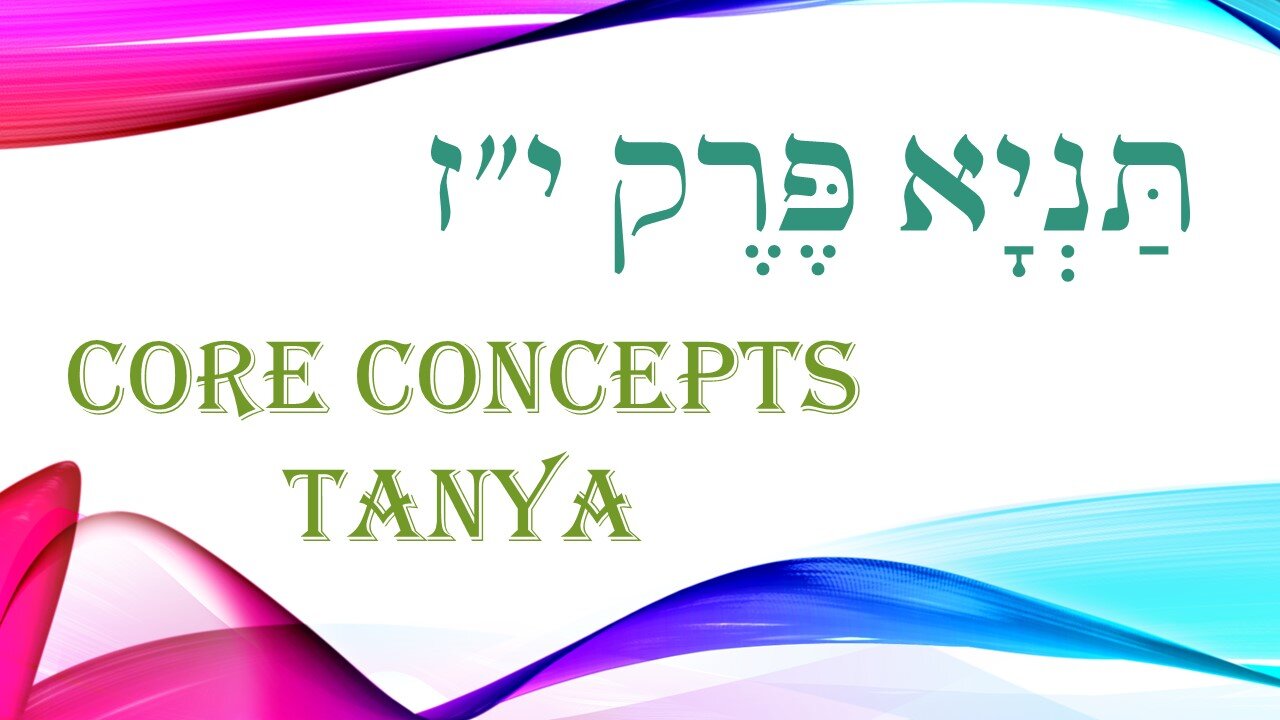Premium Only Content

Core Concepts Tanya: Chapter 17
Brief Recap of Chapter 17:
1. Chapter 17 focuses on the verse at the foundation of Tanya, "This thing is very near to you, in your mouth, and in your heart, to do it."
The verse is from the last book of the Torah, and part of the final message Moshe says to the Jewish people before he passes away and they enter the Land of Israel.
With these words he encourages them to commit to Torah and Mitzvot, because they're not something for the heavens or beyond their grasp; rather it's accessible to each person.
The Alter Rebbe points out that this verse includes the three garments of the soul: thought "in your heart," speech "in your mouth," action "to do it."
How is heart considered thought? This refers to when our mind controls our heart and then it is easy for us to do the right thing.
2. But didn't we just spend multiple chapters talking about how hard that is?
Perhaps this verse is only meant for Moshe's generation, a generation that saw miracles, the Exodus from Egypt, the splitting of the sea, the Giving of the Torah?
Torah is truth, and Torah is eternal. This verse is relevant for all generations.
And when is "this thing" AKA Torah and mitzvot most easy for us?
When our minds control our hearts. When our intellect rules our bodies. When our G-dly soul is in control.
3. And we can achieve this because we are human beings.
We walk on two legs so our minds are always above our hearts, our eyes can always look upward.
It's not beyond our reach to gain control enough to resist temptation, to say no to desire.
4. "And now Israel, what does Hashem ask from you? Just to fear Him."
The Talmud asks, "Is fear of G-d such a little thing?"
And if fear isn't, then love certainly isn't!
We each have an inherent level of love and fear within us, an inheritance from our patriarchs.
If we can tap into them, if we use these basic levels of love and fear to do what we're supposed, then we're on the right track.
Because at the end of the day, this world is a world of action, and doing is what matters most.
5. What about a rasha who has given in so many times to sin, the sin now controls him?
He can't serve G-d until he repents, but at the same time he can't tap into that love or fear because it's buried under his wrongdoings.
For him, he's already experiencing the worst punishment for losing control, which is his loss of control of self.
In many ways, he's like an addict who can only think of his next fix. He's not really living, because his addiction is in control of everything he does.
He needs to break his ego, he needs to become embittered, he needs to hit rock bottom.
Only then can he break the hold that the sin has over him.
And when he does, then he can truly repent, and more than that return to Hashem, who gladly accepts him back.
This is why the word for repentance is "Teshuvah" which could be read "Tashuv Hey," returning the Hey of Hashem's name back to where it should be and making it complete again.
6. The preliminary of Teshuvah includes: regret, remorse, resolve.
When the Jewish people went into exile, Hashem's Shechina, the Divine presence went into exile with them.
This is true as well for our G-dly soul, which is in exile in our physical bodies.
However, unlike a captive who is forced to do the will of his captor, the soul is still able to animate the body and make good things happen in this world.
The more we tap into and listen to it, the less in exile it feels.
In fact, if we all did this all that time then we'd be permanently out of exile, speedily in our days!
-
 2:38:16
2:38:16
I_Came_With_Fire_Podcast
12 hours agoDid Pete Hegseth Commit WAR CRIMES | No more INCOME TAX | More Fraud in Minnesota W/ Mike Caldarisie
20K10 -
 1:32:30
1:32:30
Adam Does Movies
7 hours ago $0.55 earnedTalking Movies + Ask Me Anything - LIVE
16.5K1 -
 2:12:14
2:12:14
TheSaltyCracker
5 hours agoWar Crimes ReeEEStream 12-03-25
72.1K156 -
 1:31:59
1:31:59
Glenn Greenwald
6 hours agoTrump Administration Claims to Save Hundreds of Millions of Lives by Blowing Up Drug Boats; Ethan Klein's Unhinged Vengeance & Lawsuits Against Other YouTubers: With Taylor Lorenz | SYSTEM UPDATE #553
104K134 -
 19:14
19:14
MetatronCore
22 hours agoHow Propaganda works on your Brain
16.4K6 -
 1:26:32
1:26:32
Joker Effect
3 hours agoWHO IS TYSON HOCKLEY?! What does the IRL streaming space look like? WHY IS EVERYONE SUEING EACHOTHER
7.37K -
 2:48:40
2:48:40
Barry Cunningham
7 hours agoLIVE BREAKING NEWS: Erika Kirk and TPUSA Have Had It With Candace Owens | Where Are The Children?
54.7K70 -
 15:30
15:30
IsaacButterfield
20 hours ago $0.99 earnedViolent Immigrant Crime Is Exploding in Australia
12.5K17 -
 8:37
8:37
DBoss_Firearms
11 hours ago $0.46 earnedHow hard is it to shoot with a G-Flex Trigger?
8.81K -
 1:05:17
1:05:17
BonginoReport
8 hours agoWhite House Claps Back At Sabrina Carpenter - Nightly Scroll w/ Hayley Caronia (Ep.189)
123K38